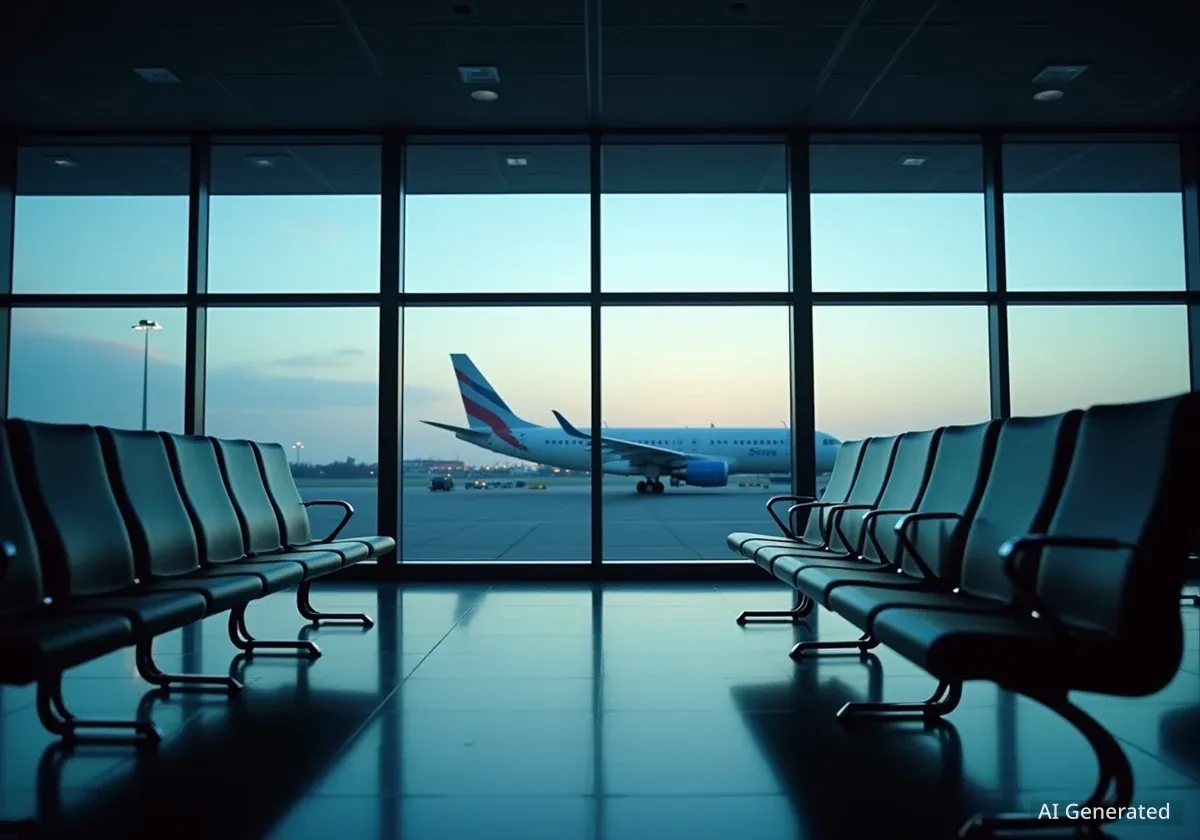The City of Dubuque is likely responsible for a $1.6 million payment to Denver Air Connection. This comes despite a recent City Council vote to delay a decision on using local tax dollars for the service. The payment is part of an agreement to ensure daily flights between Dubuque Regional Airport and Chicago O’Hare International Airport, a service many business leaders consider vital for local economic growth.
Key Takeaways
- Dubuque City likely owes Denver Air Connection $1.6 million for flight subsidies.
- The contract for Chicago flights auto-renewed, obligating the city.
- Federal grant funding for the flights has almost run out.
- Passenger occupancy rates remain below sustainable levels.
- The issue has become a topic in the upcoming 2025 mayoral election.
Contractual Obligations and Funding Gaps
The financial obligation stems from a contract signed in November by the Dubuque Airport Commission with Denver Air Connection. This agreement included a minimum revenue guarantee (MRG). Under this guarantee, the local airport must ensure a specific profit level for the airline if ticket sales do not meet a baseline.
Initially, a $2.1 million federal Small Community Air Service Development grant covered these subsidies. However, this federal funding is now nearly depleted. The contract for the flights automatically renewed in April for another six months, committing the airport and the city to further financial support.
Important Fact
The contract with Denver Air Connection requires the Dubuque Regional Airport to guarantee a baseline revenue for the airline, meaning the city must cover shortfalls if ticket sales are too low.
City Council Debates Future Funding
During budget discussions in April, the City Council considered allocating an additional $10,000 for airport marketing. However, the council did not acknowledge at that time the potential for a much larger monthly commitment, possibly 30 times that amount, for the flight service.
The Dubuque Regional Airport's budget requires City Council approval. The council also appoints members to the Airport Commission. However, a 1950 referendum established the Airport Commission to manage the airport's daily operations. The airport itself is owned by the city but is located outside city limits.
"This support is provided to encourage the carrier to start or maintain service," Airport Director Todd Dalsing stated. "The MRG agreement is executed by the Airport Commission."
Background Information
The Dubuque Airport Commission is responsible for the day-to-day management of the Dubuque Regional Airport. While the City Council approves the airport's budget and appoints commission members, the commission handles operational contracts like the one with Denver Air Connection.
The Immediate Financial Burden
The contract is scheduled for another auto-renewal next month. However, the airport must provide Denver Air Connection with 60 days' notice before ending service. This clause means the city is likely obligated to guarantee Denver Air's profits for the Chicago-Dubuque flights through at least December. This commitment is estimated to cost $1.6 million.
City Council Member Ric Jones sought to delay a decision on using local tax dollars until October. He wanted more time to review the plan. However, the financial obligation is immediate. The council must decide whether to continue spending up to $300,000 monthly in local tax dollars for the Chicago flights into 2026.
Council Member Danny Sprank acknowledged the contractual obligation for local tax dollars through the end of the year. However, he expressed doubts about justifying continued funding in 2026. "My constituents don’t want to continue to fund this," Sprank told the Telegraph Herald.
Current Cost
The estimated monthly subsidy for the Chicago flights ranges from $230,000 to $325,000, which translates to about $300 for every empty seat up to 80% occupancy.
Funding Source and Political Debate
City Manager Mike Van Milligen informed the council that leftover discretionary funds from the fiscal year 2025 budget, which concluded in June, could cover the $1.6 million payment.
The practice of using local tax dollars to subsidize passenger air service has become a significant issue in the 2025 election. This practice is similar to how the city funds its bus system, civic center, and parking ramps. Mayoral candidates Deb Borley and Jason Davis, along with council candidate Tyson Leyendecker, have publicly opposed this policy.
Passenger Numbers and Sustainability Challenges
For the flight service to be financially sustainable, flights need to be approximately 80% full. However, passenger growth has been slow. Public data on enplanements shows that passenger counts peaked in May at about 42% occupancy. This figure then decreased in June to 38%, falling below levels reported in December.
Airport Director Todd Dalsing reported that service has improved in recent months, reaching up to 50% occupancy. He noted that July and August performed better than June. Nationally, passenger numbers typically rise in the summer and decline in the fall and winter. This trend presents a challenge for the Dubuque airport as it works to increase its passenger counts.
- May: Passenger occupancy peaked at 42%.
- June: Occupancy dropped to 38%.
- July/August: Occupancy improved to 50%.
Efforts to Boost Ridership
Ticket sales saw a peak in May, then declined over the summer, before rebounding to a new high in August. This rebound coincided with a rebate promotion launched by Dubuque Initiatives and Greater Dubuque Development Corp. This program offers $100 coupons for flights booked through September 30.
The low passenger numbers mean the airport and city must cover the financial losses. City records indicate that the service still requires a monthly subsidy ranging from $230,000 to $325,000. This amount is roughly $300 for each empty seat, up to the 80% occupancy target.
Dubuque's Unique Position
Many airports in Iowa rely on federal subsidies through the Essential Air Service (EAS) program to fund commercial airline service. Airports in cities like Waterloo and Sioux City participate in this program.
Dubuque, however, did not join the EAS program when it began. At that time, its airport was considered commercially viable without subsidies. Now that the local airport faces financial challenges, the program is closed to new participants.
"The injustice here and the real challenge we face is that Dubuque falls completely within a crack. The EAS provides for other cities like us. This program is what keeps this service afloat for them," Mayor Brad Cavanagh explained. "The entire problem is on our backs. We are on our own trying to figure out at this moment how we can continue to fly in the city of Dubuque."
Community Perspectives on Air Service
Despite some hesitation about formally approving future subsidies, the City Council generally supports the airport and the Chicago flights. Council Member Katy Wethal emphasized the importance of air service. "Air service is not just a whim of the moment. Air service is a necessity of the future," she stated. "I am not throwing in the towel. Now is the worst time to pull back the reins."
Business and civic leaders, including representatives from Dubuque's colleges, Molly Grover (President and CEO of Dubuque Area Chamber of Commerce), and Jason White (Vice President at Greater Dubuque Development Corp.), have voiced strong support for continued local tax funding for the air service, calling it essential for the local economy.
Community Support
Local business leaders and educational institutions view the Chicago flights as crucial for connecting Dubuque to larger economic hubs and supporting regional development. They advocate for continued financial support to maintain this service.
Jason White acknowledged the difficulties but urged persistence. "It’s tempting to give up when times are tough. The numbers are improving but not yet sustainable," White said. "In the greater Dubuque community, we’ve always stuck up for ourselves when adversity strikes. Let’s do that again."
However, not all local leaders agree. Former Dubuque Community School Board member Jim Prochaska argued against placing the financial burden of air service for the business community on average taxpayers who may not use the airport.
"I encourage you to NOT further subsidize the current air service and consider other methods to make our city a viable departure/arrival airport. It has been obvious that this subsidizing is only a band-aid approach … and not a plan that’s in the interests of the citizenry as a whole," Prochaska wrote. He suggested that any city budget surplus would better benefit the community through other improvements.





